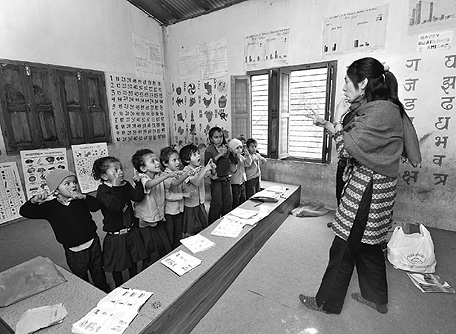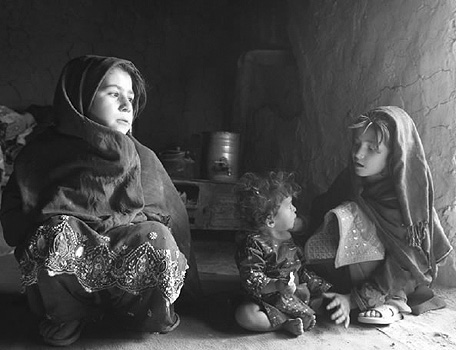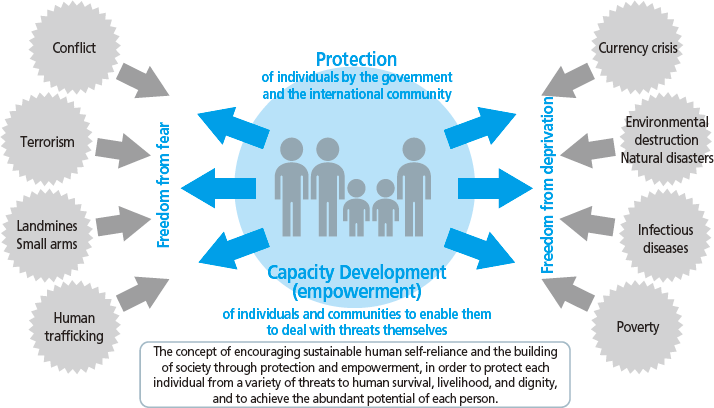Japan's Official Development Assistance White Paper 2011
Chapter 2 Toward Achievement of Equitable Development

A Japan Overseas Cooperation Volunteer conducts model teaching of arithmetic at an elementary school in Nepal. Local teachers are provided with guidance in the nature of student-centered teaching. (Photo: Koji Sato/JICA)
Section 1 The Viewpoint of Equity and Human Security
While the movement of people, goods, capital, and information, etc., easily crosses national borders on a global scale, threats to people, such as the internationalization of internal conflict, terrorism, spread of infectious diseases, human trafficking and the refugee problem due to increase in the movement of people, economic crises, expansion of the poverty problem, global climate change, environmental problems, disasters, are also becoming more diverse and more severe. To respond to such global issues, the concepts of human security (See the figure on page 32), equity, mutual assistance, and sustainability are becoming increasingly important.
In particular, the concept of "human security," which aims to focus on each person living in fear and to create a society in which people are free from fear and want and live in dignity, in addition, the concept of "equity," which aims to ensure that no one is excluded from the hand of assistance, will be the keys for Japan's cooperation.
Human Security —Disemination and Implementation of the Concept—

A camp for internally displaced persons in Kabul, Afghanistan. The mud homes were made by the refugees themselves. (Photo: Mika Tanimoto/JICA)
In addition to taking the lead in emphasizing the concept of human security from the 1990s, Japan has been translating its concept into practical actions as a pioneer. In the globalized international community, the state still retains a primary role in protecting the citizens of the nation. However, to effectively deal with global issues, it is also true that there will be certain cases, such as when the government fails to function due to conflict, etc., in which the state cannot completely protect the people through the traditional practice of "national security," that means the state protects the country's borders and people. Accordingly, the concept has been advocated as a way to complement and enhance efforts to ensure the national security, focusing on each individual person.
To promote human security, it is necessary for domestic and overseas governments, international organizations, civil society, and other related parties to understand the importance of human security in the first place. To accomplish this, Japan not only takes the lead in discussions at the UN, for example, but also cooperates with international forums, conferences, and NGOs. In addition, in January 2011, a session on human security was held at the Davos Forum (World Economic Forum).
Moreover, through the United Nations Trust Fund for Human Security that was established in 1999 under the initiative of Japan, Japan has supported concrete projects consistent with the concept of human security, contributing ¥40.2 billion (approximately $360 million) in total up to this point, implementing 206 projects in 121 countries and regions. In addition, on its own, Japan has implemented 1,176 projects in 122 countries and 1 region in FY2010 alone through grassroots human security grant aid.
One example of assistance provided through the United Nations Trust Fund for Human Security is the "Integrated Community Empowerment and Peace-building Support Project in Ituri" in the Democratic Republic of the Congo. In this project, Japan cooperated with four international organizations—the United Nations Development Programme (UNDP), the Food and Agriculture Organization of the UN (FAO), the United Nations Children’s Fund (UNICEF), and the Office of the United Nations High Commissioner for Refugees (UNHCR)— to conduct activities to strengthen the ability of individuals and communities in the diverse fields including agriculture, the fishing industry, and stockbreeding. The activities included technical guidance, repair of local government facilities, training for medical professionals, and providing health and hygiene education for residents. Further, Japan has used bilateral aid in the form of supplementation of these types of assistance to enable comprehensive, diverse, and multilayered aid to the communities.
The three approaches of human security, in short, (i) a people-centered approach that emphasizes not only "protection" of people and their communities from threats but also "empowerment" to allow them to determine and implement action by themselves to deal with those threats, (ii) a comprehensive, cross-sectional approach, and (iii) a participatory approach that emphasizes collaboration and coordination among national and local governments, international organizations, NGOs, civil society, and a variety of actors in development activities, are not only concepts that will be crucial to aid in the future, but also important viewpoints to ensure another vital key, "equity."
Ensuring Equity
Currently, the international community is continuing its efforts to achieve the shared Millennium Development Goals (MDGs). However, because the indicator used to measure the results are mostly national averages, the gaps between wealthy and poor, urban and rural areas, men and women, and different ethnic groups, etc., within the country are hidden, and there is a problem in that aid does not necessarily reach the people who are in weak positions and require assistance. To avoid such circumstances as well, there will be more necessity to apply the concept of equity that considers the gap between wealthy and poor and the circumstances of the socially vulnerable in developing countries.
In 2010, Japan provided support for the Multiple Indicator Cluster Survey (MICS) conducted in Ghana by the United Nations Children's Fund (UNICEF). The survey was used to gather statistics on health, education, child protection, and HIV/AIDS from the standpoint of equity, throughout the entire nation of Ghana. It has been used not only by UNICEF, but also by Ghanaian government and other donors in the determination of policy, planning of operation and projects and other activities.
At the UN World Summit held in September 2010, Japan announced its global health policy. The approach is to set numerical goals for success and implement high-quality monitoring and evaluation in cooperation with the international community to determine how many lives have been saved, and to submit reports of the specific results. MICS has the same orientation as these measures.
Aid that aims to ensure human security that is focused on individual humans is aid that ensures that equity is within reach of the weak, and at the same time, that aid that ensures equity is crucial to ensuring human security in that community. The two concepts are in close cohesion.
To maximize efforts toward achievement of the MDGs, with their quickly approaching deadline in 2015, Japan hosted the MDGs Follow-up Meeting in Tokyo in June, 2011, and held in-depth discussions on the importance of the viewpoints of equity and ensuring human security, toward achievement of the MDGs. In addition to continuing to emphasize the importance of the concepts of equity and ensuring human security to the international community, Japan will steadily implement aid based on these concepts.
Terminology
*Multiple Indicator Cluster Surveys (MICS)
MICS are household surveys implemented on a nationwide scale, normally once every three years, to monitor progress towards the achievement of major international goals such as the MDGs and the goals that were set at the UN General Assembly Special Session on HIV/AIDS. Areas targeted by MICS include health, education, child protection and HIV/AIDS.
The concept of ensuring human security

